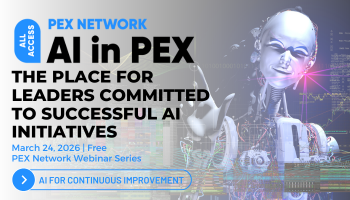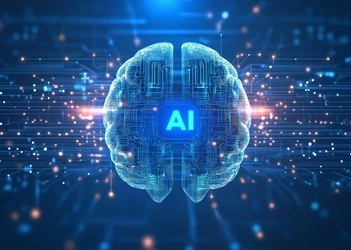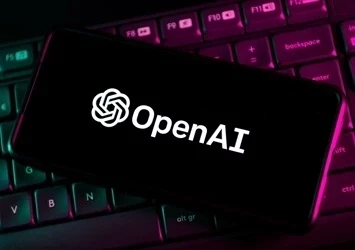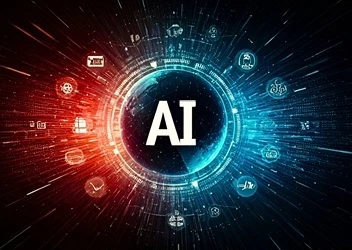Agentic AI and the future of process management
Navigating a new era of intelligent autonomy
Add bookmark
Agentic AI is the latest buzz term of the AI era. Defined as goal-driven software entities, AI agents complete tasks and achieve goals without requiring explicit inputs, capable of producing non-predetermined outputs.
While today’s AI models can perform tasks such as generating text, they are still “prompted” and do not act alone. However, that is going to change with agentic AI, according to Gartner. The research and analyst giant predicts that, by 2028, 33 percent of enterprise software applications will include agentic AI, up from less than 1 percent in 2024. This will enable 15 percent of day-to-day work decisions to be made autonomously.
Fellow research heavyweight, Forrester, echoes similar sentiments. It cited the evolution of AI agents as “perhaps the most exciting development” reflected in its Top 10 Emerging Technologies For 2024 list.
“AI agents are now leveraging advanced language models to perform complex tasks, make decisions and interact autonomously on behalf of enterprises or individuals,” Forrester stated. This shift from purely generative AI to ‘agentic AI’ promises more sophisticated and less brittle automation capabilities. “It is also a major factor in the evolution of other important emerging technologies,” Forrester added. These include TuringBot agents, edge intelligence and autonomous mobility.
Join the PEX Network community

Don't miss any news, updates or insider tips from PEX Network by getting them delivered to your inbox. Sign up to our newsletter and join our community of experts.
Learn MoreRise of agentic process management
The evolution of agentic AI is also giving rise to another related concept – agentic process management. This is an approach that utilizes the power of agentic AI to enhance process management. It should be considered a “disruptive force” in the long-term, according to Craig Le Clair, VP, principal analyst at Forrester.
“Today’s process tools rely on brittle customization and configuration. Exceptions and deviations must be explicitly configured in the system. Agentic systems can adapt to the dynamic and unpredictable nature of real-world processes. In short: the way things actually get done. We already see AI agents, which are more task oriented than agentic systems, becoming active participants in our workflows.”
This AI-based orchestration will be a disruptive force to process tool markets, with agentic ambitions reshaping the landscape, adds Le Clair. “New AI-led platform vendors will be selected to build agentic processes and carve out a market for agentic process management. They will integrate core systems and humans, like today’s process tools, but also be adept at managing a variety of models which are growing in types and in number.”
In industries like finance, healthcare and software development, AI agents will handle routine tasks like risk analysis, customer support and even coding, leading to significant operational efficiency, says Nathniel Palmer, CEO of Infocap. “This evolution will bring about more independent, adaptable and self-learning systems, drastically reducing the need for human oversight.”
With agentic AI, process management will advance from managing APIs and bots to managing multiple models. “Opensource, hyperscaler, corporate models and emerging devise models will swarm among corporate systems,” according to Le Clair. He cites the example of advancements in hardware and optimization techniques making it possible to deploy smaller, more efficient models on devices like desktops and smartphones, leading to hundreds of automation endpoints.
Michael Arena, thought leader and researcher, discusses the power of social capital in the age of AI
What’s is agentic AI?
When people think of AI in process management, it’s often seen as a tool to automate repetitive tasks – more of the same, just faster, says Ethan Monkhouse, president and chief operating officer COO at NAVIRO. “Agentic AI is different. It’s not just about ‘getting more done’ – it’s about redefining what work means in an organization. I believe we’ll see these AI agents take on roles that will completely upend traditional hierarchy and decision-making.”
The true value of agentic AI isn’t in automating tasks, but in eliminating unnecessary processes altogether, Monkhouse adds. “A lot of what happens in business today is repetitive bureaucracy, and companies keep adding layers to ‘manage’ that complexity. What if AI agents could actively decide which processes to kill off?” Imagine an AI that looks at a six-step approval chain and reduces it to one – or better yet, decides that the process itself doesn’t add value and cuts it entirely, Monkhouse says.
“The future of Agentic AI is less about making us more efficient at doing the wrong things and more about showing us what we shouldn’t be doing in the first place. At NAVIRO, we’re experimenting with this kind of technology internally – using AI not just to automate but to make structural recommendations that force us to rethink how we operate.” The results have been surprising, Monkhouse claims. “It’s shown us where we’ve been duplicating efforts or holding onto processes that don’t add value. The AI isn’t just ‘doing things for us,’ it’s showing us where we’re wasting time.”
Looking forward, agentic AI is likely to evolve further, becoming even more intelligent and dynamic, says Dom Couldwell, head of field engineering EMEA at DataStax. “Future systems may consist of highly interconnected networks of AI agents that communicate and collaborate in real-time, handling ever more nuanced and sophisticated tasks. This evolution will not only enhance the capabilities of AI but also extend the potential for human-AI collaboration, opening up new possibilities in diverse fields where complex process management is essential.”
The long-term trajectory points towards the dominance of agentic AI in business process management, says Manoj Chaudhary, CTO of Jitterbit. “As trust in AI grows and advancements are made in areas such as security, bias mitigation and system maturity, AI agents are poised to become more prevalent in streamlining and optimizing business operations.”
Tariq Munir, PepsiCo, explores measuring the impact of AI
What are “true” AI agents?
It seems like everywhere you turn, every product is suddenly an “AI gent,” claims Karli Kalpala, head of region UK and Ireland and strategy transformation at Digital Workforce Services Plc. “The truth is, most of what’s being labeled as an agent is still just an assistant – programs that follow predefined workflows, relying heavily on human intervention. True AI Agents take things to the next level: They plan, reason and act autonomously. No flowcharts. No low-code gimmicks. Just natural language instructions, fully embedded into your business, working 24/7.”
They aren’t there to help a human – they take the agency out from human to themselves in executing complex tasks, according to Kalpala. Essentially, a true AI Agent replaces the human as the unit that performs the work, automating entire processes autonomously.
Lee Bogner, Mars, reflects on the convergence of AI and data
Challenges of agentic AI
As with any advance in technology, there are a number of challenges surrounding agentic AI – particularly with regards to implementing it in the enterprise, experts agree. There are many advantages of agentic AI but today it comes as a significant additional cost both in terms of development and maintenance. Careful consideration needs to be made as to the right solution to the problem being presented,” says Couldwell.
This kind of AI-driven autonomy will challenge a lot of conventional thinking around management, adds Monkhouse. “I see agentic AI introducing a level of decentralized decision-making that will be very uncomfortable for traditional leadership structures. Leaders will have to focus more on guiding principles rather than micromanaging details. That’s going to expose a lot of organizational insecurity and resistance.”
Applying AI agents within the enterprise requires additional considerations to ensure they meet the specific demands of business environments, according to Digital Workforce. Five key components are necessary for deploying AI agents in an enterprise context.
- AI agents must be business user-friendly with instructions defined by business users using plain English so that no coding or IT intervention is required.
- AI agents need to be enterprise-context aware and connect seamlessly to enterprise applications, data and documents, regardless of whether they are modern or legacy systems.
- AI agents should run 24/7, performing tasks autonomously while learning and improving over time without constant human oversight.
- AI Agents must operate within an enterprise’s virtual private cloud (VPC) to guarantee cyber security.
- AI agents must be fully transparent and offer an audit trail of their reasoning and actions to maintain trust and compliance.
All Access: AI in Process Excellence 2026

Don’t get left behind. Join us at All Access: AI in Process Excellence to learn from leading experts, thought leaders, and practitioners who are on the ground experimenting, researching, and learning how to best use AI. They will share their secrets with you for free. And you’ll have the opportunity to network with fellow professionals as we navigate this new world. Register now to save your spot.
Register Now































